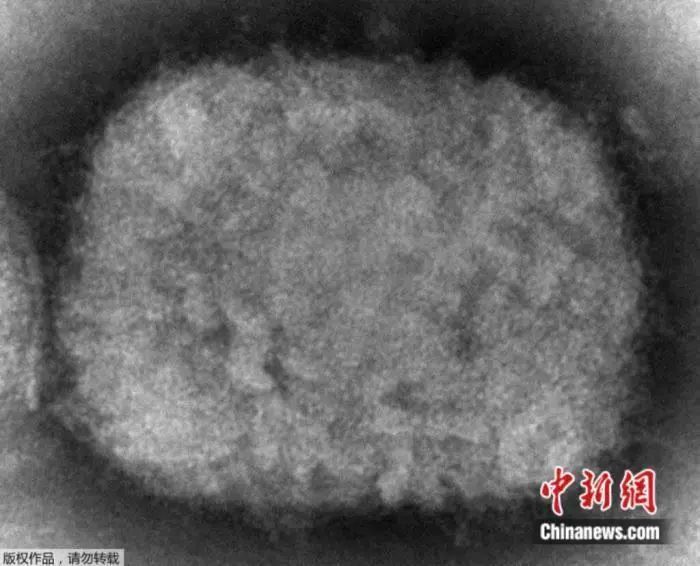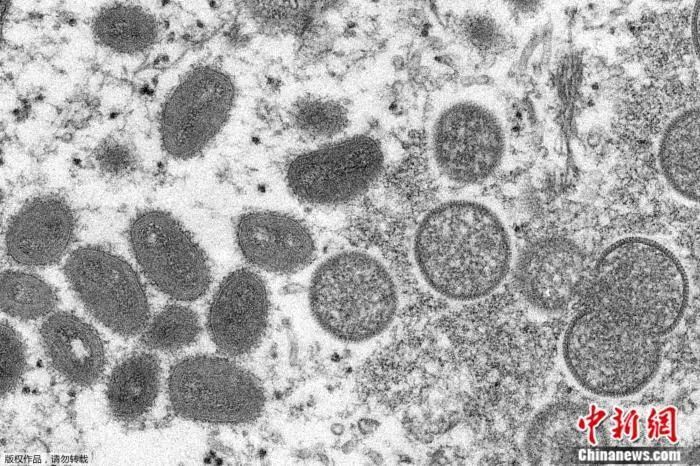According to comprehensive reports, up to now, monkeypox infection has spread to a total of 15 countries outside Africa, arousing vigilance and concern from the outside world. Can monkeypox virus mutate? Will there be a massive outbreak? Is the smallpox vaccine still effective against monkeypox infection?
1. What is monkeypox?
Monkeypox is a viral zoonotic disease that was discovered in laboratory animal monkeys in 1958, mainly in the rainforest countries of central and western Africa.
There are two clades of monkeypox virus, the West African clade and the Congo Basin (Central Africa) clade. The first human case of monkeypox infection was found in Congo (DRC) in 1970.

PHOTO: A 2003 electron microscope image from the U.S. Centers for Disease Control and Prevention (CDC) shows a monkeypox virus particle.
2. How is monkeypox contagious?
Monkeypox can be spread through sexual activity, body fluids, skin contact, respiratory droplets, or contact with virus-contaminated items such as bedding and clothing.
Monkeypox can also be transmitted through contact with infected animals such as monkeys, mice and squirrels.
3. What are the symptoms of monkeypox?
Monkeypox produces a rash that starts as a flat, red spot that becomes raised and filled with pus. Infected people also experience fever and body aches.
Symptoms usually appear 6 to 13 days after infection, but can take up to three weeks. The illness can last two to four weeks, with severe cases usually occurring in children, according to the WHO.
4. What is the fatality rate of monkeypox?
Although the pathogenicity of human infection with monkeypox virus is less than that of its similar virus, variola virus, it can still lead to death, with a fatality rate of 1%-10%. So far, there is no effective treatment for the disease.

PHOTO: WHO Director-General Tedros Adhanom Ghebreyesus. Photo by China News Agency reporter Peng Dawei
5. How many cases are there this year?
WHO Director-General Tedros Adhanom Ghebreyesus said on the 22nd that monkeypox has spread to 15 countries outside Africa. More than 80 cases have been confirmed in Europe, the United States, Canada, Australia and Israel.
The U.S. Centers for Disease Control and Prevention (CDC) said on the 23rd that it was investigating four suspected cases of monkeypox, all of which were male and related to travel. In Europe, the UK Health and Safety Authority issued a statement on the same day that there were 36 new cases of monkeypox in England, the first case of monkeypox was found in Scotland, and the total number of cases in the country increased to 57.
6. Will there be a large-scale outbreak of monkeypox?
The New York Times believes that, under normal circumstances, monkeypox does not lead to large-scale outbreaks. The worst outbreak in the United States occurred in 2003, when dozens of cases were linked to exposure to infected prairie dogs and other pets.
Most of the cases this year have occurred in young men. Heiman, a WHO infectious disease expert, pointed out that the current monkeypox epidemic in various countries is a "random event", and the main route of transmission this time may be related to unsafe sex at two parties held in Spain and Belgium.
7. Does monkeypox mutate?
Reuters quoted Lewis, head of the WHO's "smallpox secretariat" as saying on the 23rd that there is no evidence that the monkeypox virus has mutated, and pointed out that the possibility of the virus mutating is low.
WHO epidemiologist Van Kerkhove also said that the recent suspected and confirmed cases in Europe and North America are not serious, and the current situation is controllable.

PHOTO: Electron microscope images provided by the U.S. Centers for Disease Control and Prevention show mature monkeypox virus (left) and immature virions (right).
8. Can the smallpox vaccine prevent monkeypox infection?
According to the BBC, the smallpox vaccine has been shown to be 85% effective in preventing monkeypox and is still sometimes used.
Rena McIntyre, an infectious disease scientist at the University of New South Wales in Australia, also said that studies have shown that because the large-scale suspension of smallpox vaccination has been 40 to 50 years, the immune protection ability of the smallpox vaccine has declined, which may be the cause of the monkeypox epidemic. cause of exacerbation. She advised authorities to identify contacts associated with monkeypox patients and vaccinate them against monkeypox.
9. How are many countries responding?
CDC official McQueston said on the 23rd that the agency is providing a batch of smallpox vaccines, and will give priority to close contacts with monkeypox patients, medical staff and high-risk groups who may develop severe cases. The UK Health Security Agency also recommends a smallpox vaccine for high-risk groups.
Freitas, director of the General Directorate of Health in Portugal, suggested that infected people and close contacts need to be isolated and not to share clothing and items with others. Belgium has mandated a 21-day quarantine for cases of monkeypox infection.
The Robert Koch Institute, Germany's disease control agency, is conducting research on epidemic prevention recommendations, including whether it is recommended to isolate confirmed cases and close contacts, and who is recommended to be vaccinated against smallpox.
10. How to take precautions?
WHO recommends that any illnesses during travel to or upon return from endemic areas, should be reported to health professionals.
WHO also emphasizes the importance of recognizing hand hygiene with soap and water or alcohol-based sanitizer.
11. How to detect?
Monkeypox is mainly caused by respiratory droplets and mucous membrane contact, so the best way to detect it is a PCR nucleic acid test very similar to the COVID-19. Use monkeypox virus nucleic acid detection kit (PCR-fluorescent probe method).
Monkeypox virus is the virus that causes the disease monkeypox in both humans and animals.
Monkeypox virus is an Orthopoxvirus, a genus of the family Poxviridae that contains other viral
species that target mammals. The virus is mainly found in tropical rainforest regions of central and
West Africa. The primary route of infection is thought to be contact with the infected animals or
their bodily fluids.The genome is not segmented and contains a single molecule of linear
double-stranded DNA, 185000 nucleotides long.
The detection step of the PCR-fluorescent probe method on the market is usually to first extract and purify the DNA of monkeypox virus, and then carry out the PCR reaction. If Foregene's leading Direct PCR technology is used, the tedious steps of extracting monkeypox DNA can be omitted, and the DNA in the monkeypox virus can be directly released by the sample release agent, and the PCR reaction can be performed directly. Convenient and fast!
Related products:
IVD Raw material:
Post time: May-27-2022








